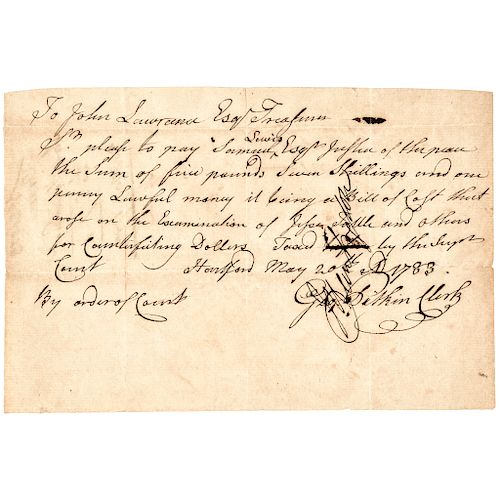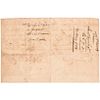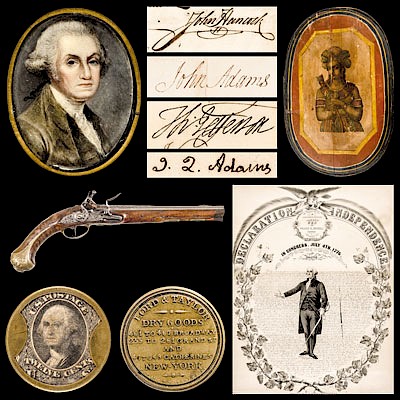1783 Payment - Examination of Jesse Tuttle and others for Counterfeiting Dollars
Lot 115
About Seller
Early American History Auctions
1520 Commerce St., #312
Winchester, VA 22601
United States
Estimate:
$1,200 - $1,600
Absentee vs Live bid
Two ways to bid:
- Leave a max absentee bid and the platform will bid on your behalf up to your maximum bid during the live auction.
- Bid live during the auction and your bids will be submitted real-time to the auctioneer.
Bid Increments
| Price | Bid Increment |
|---|---|
| $0 | $10 |
| $200 | $20 |
| $300 | $25 |
| $500 | $50 |
| $1,000 | $100 |
| $2,000 | $200 |
| $3,000 | $250 |
| $5,000 | $500 |
| $10,000 | $1,000 |
| $20,000 | $2,000 |
| $30,000 | $2,500 |
| $50,000 | $5,000 |
| $100,000 | $10,000 |
| $200,000 | $20,000 |
| $300,000 | $25,000 |
| $500,000 | $50,000 |
About Auction
By Early American History Auctions
Jun 1, 2019
Set Reminder
2019-06-01 12:00:00
2019-06-01 12:00:00
America/New_York
Bidsquare
Bidsquare : Historic Autographs, Colonial Currency, Political Americana & Revolutionary War Era
https://www.bidsquare.com/auctions/early-american-history-auctions/historic-autographs-colonial-currency-political-americana-revolutionary-war-era-4152
Historic Autographs, Coins, Currency, Political, Americana, Historic Weaponry and Guns, John Adams, Thomas Jefferson, Early American History Auctions auctions@earlyamerican.com
Historic Autographs, Coins, Currency, Political, Americana, Historic Weaponry and Guns, John Adams, Thomas Jefferson, Early American History Auctions auctions@earlyamerican.com
- Lot Description
Connecticut Currency
"Examination of Jesse Tuttle and others for Counterfeiting Dollars"
May 20, 1783-Dated, Revolutionary War Period, Manuscript Document Payment for "Costs" Signed, George Pitkin, and (General) Jedidiah Huntington, at Hartford (CT.), Choice Very Fine.
May 20, 1783-Dated Revolutionary War, Manuscript Document Signed, "George Pitkin" as Clerk 7.75" x 5.25", Choice Very Fine. This Document being a Treasury request to pay Samuel Lewis, Esq. Justice of the Peace for his "... Bill of cost of examining Jesse Tuttle and others for Counterfeiting Dollars." This Document reads, in full:
"To John Lawrence, Esq. Treasurer ---
Sir, please to pay Samuel Lewis, Esq. Justice of peace the Sum of five pounds Seven Shillings and one penny Lawful money it being a Bill of Cost that arose on the Examination of Jesse Tuttle and others for Counterfeiting Dollars. Tasked by the Superior Court. -- Hartford -- May 20th 1783. --- By order of Court -- (Signed) Geo. Pitkin Clerk". (Oversigned with the signature of (Jedidiah) "Huntington." Docket on the blank reverse. Normal folds, boldly written in rich deep brown upon period laid paper.
Samuel Lewis Esq. Deacon of Waterbury, CT. Patriot who served as Justice of Peace, attorney, and Selectman during the Revolutionary War.
George Pitkin (1709-1806) was appointed Colonel in 1775 in command of the 4th Connecticut Regiment that marched to Boston following the Battle of Lexington and Concord. He served as clerk to both Connecticut Superior and Supreme Courts.
John Lawrence, Esq. was State Treasurer of Connecticut during the Revolutionary War and after.
Jedediah Huntington -
In October of 1774, Jedediah Huntington of Norwich was made Colonel of the 20th Regiment of Connecticut Militia. When news of the Battles of Lexington and Concord arrived in Norwich on April 20, 1775 Colonel Huntington immediately got his men ready to march. On April 26 they arrived in Wrentham, Massachusetts, and a few days later they were in Roxbury and became part of the Siege of Boston. Because of a lack of overall command, as well as a lack of supplies, many of the militia units returned home.
In July of 1775, the Connecticut Assembly ordered the creation of the 8th Connecticut Regiment and gave command to Colonel Huntington. The men were recruited mainly in New London, Hartford, and Windham Counties and included much of Huntington's 20th regiment.
The regiment was stationed on the Long Island Sound until September 14 when, on requisition from Washington, it was ordered to the Boston Camps and again took its post at Roxbury in Gen. Spencer's Brigade. The 8th remained active until expiration of the terms of service in December of 1775.
As part of the January 1, 1776 organization of the Continental Army, Huntington's 8th Connecticut Regiment became the 17th Continental Regiment. Originally planned to have a strength of 728 officers and men, by the end of January the 17th only had about 400, as did most of the other regiments. On March 4, the 17th regiment was one of those ordered to take and hold Dorchester Heights, the action that ended the siege by forcing the British to evacuate Boston.
The day following the end of the siege, Washington began moving the army to New York, and by April 22, Huntington and most of his unit were in position there. Huntington's regiment began fortifying New York City in anticipation of a British attack and it was here they heard of the Declaration of Independence.
The 17th had lost men during the Boston siege due to illness and desertion, which continued in New York. On about August 19, Colonel Huntington became seriously ill, possibly with malaria, and was unable to perform his duties, so his second in command Lt. Col. Joel Clark replaced him. On August 24, the regiment was ordered to the Brooklyn front. Because it was so understrength it was placed under the command of Gen. Parsons and combined with Col. Atlee's Pennsylvania regiment.
When the Battle of Long Island was fought on the 27th, most of Huntington's regiment was surrounded and taken as prisoners, including Lt. Col. Clark, who died in captivity. The few men left of Huntington's regiment joined the main army under the command of Gen. Heath and evacuated with them as they fled New York
- Shipping Info
-
Early American provides in-house worldwide shipping. Please contact us directly if you have questions about your specific shipping requirements.
-
- Buyer's Premium



 EUR
EUR CAD
CAD AUD
AUD GBP
GBP MXN
MXN HKD
HKD CNY
CNY MYR
MYR SEK
SEK SGD
SGD CHF
CHF THB
THB












